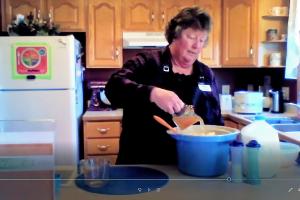PEKIN, Ill. - While it is important to educate people about nutritious eating, it is equally important to teach them how they can afford nutritious foods on a budget. Supplemental Nutrition Assistance Program—Education (SNAP-Ed) staff at University of Illinois Extension staff offer Healthy Cents 12-part series to adults in an online format.
"The Healthy Cents curriculum has provided a new outlet for us to reach both men and women with a series of lessons designed to assist them in recognizing healthy food and how they can afford it,” explained SNAP-Ed Community Worker Krista Gray. “With the main focus on fruits and vegetables, we are able to teach people that they can afford nutritious foods on a budget through outlets such as container gardens, buying in season, looking for sales, and utilizing food pantries.”
The SNAP-Ed team that serves Fulton, Mason, Peoria, and Tazewell counties worked together to convert the curriculum into a virtual format that provides nutrition and budgeting lessons, interactive activities, recipe demonstration videos, and time for audience interaction.
“The lessons really engage our audience,” mentioned Skye Mibbs,
SNAP-Ed community worker. “We allow time for participants to ask questions and offer their own insights. The information sharing that goes on is amazing. I always learn something new from them.”
To date, 39 participants have taken part in the Healthy Cents program. As the SNAP-Ed team continue to offer the program and reach out to new audiences they expect that number to keep growing.
“HEAL-Food System Partners collaborated with our SNAP-Ed team’s Healthy Cents program and provided $25 grocery gift cards to participants for every four classes they attended,” Skye explained. “HEAL is a collaborative group funded by the Community Foundation of Central Illinois that brings together existing food system programs to increase food access, advance community education, and create agricultural and community development opportunities. This group set a goal to provide nutrition budgeting education to low income families in the community. Our program was a perfect project to join forces.
“The lesson about container gardens sparked another exciting collaboration that provided 50 containers that will be given to participants to use to make their own gardens,” stated Skye. “I think these collaborations are great examples that show the importance of the lessons we are teaching, the success of the program, and the amazing things that can happen when we work together towards a common goal.”
SOURCE: Skye Mibbs, svmibbs@illinois.edu, SNAP-Ed Community Worker
ABOUT EXTENSION: Illinois Extension leads public outreach for University of Illinois by translating research into action plans that allow Illinois families, businesses, and community leaders to solve problems, make informed decisions, and adapt to changes and opportunities.
